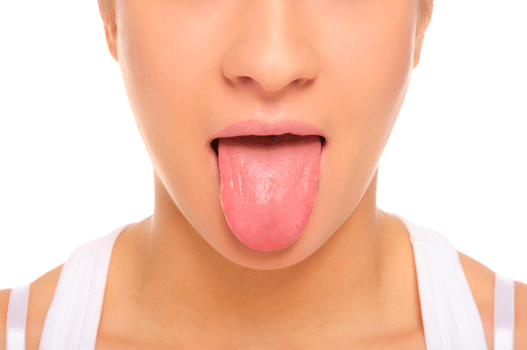Say, “Ah.” When doctors and dentists look at your tongue, they are getting a look at your overall health. Find out how you can, too.
The tongue is one of the most forgotten body parts when it comes to understanding your own health. Medical professionals can, however, tell a lot about how healthy we are just from looking at our tongues. “Ayurveda and Traditional Chinese Medicine have been advocating and performing this type of visual inspection for thousands of years,” writes Ashley Pitman, a wellness educator, in Yoga Today. “In fact, tongue diagnosis is actually a very old practice that dates back to the Shang Dynasty, which began around 1600 B.C.”
Health Indicators
Your tongue should be pink and appear lively; if it is red or pale or has a white coating, it may indicate other health issues. Ayurveda, the sister subjective science to yoga, breaks the tongue into different sections corresponding to different organs. The belief is that if there are abnormalities within the tongue in these areas, there may be problems within the corresponding organs.
Acupuncturists often look at the tongue to determine if there are health issues relating to blood flow. The tongue is a truly internal organ that can be accessed externally in order to get a better idea of a person’s health status. From an acupuncturist’s point of view, a pale tongue is not healthy because it is not receiving enough blood. Therefore, there is a lack of circulation within the body.
Dr. Oz, along with oral health specialist Dr. Jonathan Levine, discusses the health of our tongue in one of his television segments. Oz and Levine show how the tongue can highlight three critical health issues: lesions may indicate oral cancer; ulcers can suggest high levels of stress; and a white, filmy coat may signify that your tongue is the optimal breeding ground for bacterial infections.
Now, for you woodwind players reading this article, think about putting a filmy, white-coated tongue on your instrument. It’s a scary thought—the bad bacteria causing the white coat on your tongue can breed more bacteria on your instrument and make you sick.
Daily Routine
Examining, brushing and/or scraping your tongue should be part of your daily routine. Because there are mixed schools of thought as to whether or not you should brush your tongue, consult your doctor or dentist before adding something new to your health regimen. If you are worried about damaging your tongue and/or taste buds by brushing, then try scraping it. Tongue scrapers, which look like a thin metal U-shaped tool, can be found in most health food stores.
So, check out your tongue, and if you have any questions, be sure to talk to your doctor. There’s got to be a reason that doctors look in our mouths during a physical.


